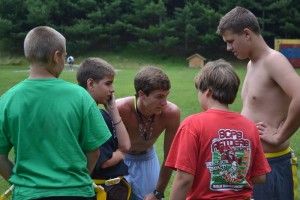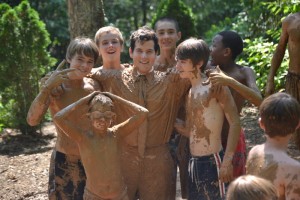Conversation Starters: Pray for Our Country
Posted by Phil Tuesday is the 11th anniversary of the September 11 attacks. Monday, September 17, marks the 225th anniversary of the signing of the US Constitution. Each night this week, pray specifically for someone or something related to American freedoms, responsibilities, or challenges.
Tuesday is the 11th anniversary of the September 11 attacks. Monday, September 17, marks the 225th anniversary of the signing of the US Constitution. Each night this week, pray specifically for someone or something related to American freedoms, responsibilities, or challenges.
Sunday: Pray for your local fire and police departments, and any officers or firefighters you know personally.
Monday: Pray for American military personnel who are serving overseas and their families who are here.
Tuesday: Pray for missionaries who work in primarily Muslim countries. Check out IMB’s website www.lovingmuslims.org for additional helps.
Wednesday: Pray for your District’s Congressional Representatives and your state’s senators. For a complete listing, go to www.house.gov and www.senate.gov.
Thursday: Pray for the President and Vice President.
Friday: Thank God for the freedom we have as American citizens. Ask God to help us make good decisions as a country.
Saturday: One of the freedoms the Constitution guarantees is freedom of religion. Pray for all pastors and church leaders (especially yours!) as they prepare for a full day of ministry tomorrow.
Posted in Just For Parents | Tagged Camp Crestridge, Camp Ridgecrest, Conversation Starters, parent resourses, Prayer, Ridgecrest Summer Camps, September 11th | Leave a reply
Finding the meaning of life
Posted by Phil Today you are a parent of a precious child living in a world filled with thieves intent on stripping him of his innocence and purpose. Life has a way of providing experiences that can compose a toxic life narrative for a child.
Today you are a parent of a precious child living in a world filled with thieves intent on stripping him of his innocence and purpose. Life has a way of providing experiences that can compose a toxic life narrative for a child.
Sometimes what you thought would never happen, happens. Piercing those painful days are moments that alter your child’s views of self, others, and God. And, if you’re not careful, the narrative of your child’s life will contain misplaced punctuation points. Periods instead of conjunctions. Points that stop the flow of life rather than expand passion and connections. Many times a child’s story contains truth with a mixture of misperceptions about self, the world, and God.
The truth is, life is both wonderful and confounding. Much that befalls our children is not preventable. Crises will occur.
How might your child’s view of God be falsely edited by life experiences? How can you as a parent nurture a resilient child who maintains healthy beliefs about life and about God even as he becomes acutely aware of and interacts with a fallen world?
Specific family qualities emerged from research conducted over the past 10 years at New Orleans Baptist Theological Seminary and the Psychological Studies Institute in Chattanooga. More than 400 families were examined to determine the family characteristics and behaviors that produce healthy families. The research revealed that children within these families are more likely to emerge with core beliefs that serve as powerful tools to interpret life’s inevitable intrusions in a more constructive, life expanding way – interpretations that are consonant with God’s narrative. Yes, it’s a long list. But each of these characteristics contributes to a child’s resiliency in life.
A healthy family …
1. Exemplifies a strong sense of family
- Has a sense of family unity, permanency, and history
- Has family rituals and traditions
- Shares meals and communicates during meals
- Engages in leisure activities together
2. Uses clear, honest communication
- Expresses feelings openly and without judgment
- Discusses goals and dreams together
- Listens carefully to one another
- Does not act out anger physically
3. Is open and affirming
- Engages in positive forms of touch
- Attends to the emotional needs of the family
- Smiles and laughs often; shares hugs and kisses
- Praises one another in public; says “I love you” often
4. Shares a sense of mutuality and support
- Expresses appreciation for one another often
- Takes physical care of one another as needed
- Accepts the eventual separation of the children
5. Demonstrates trust and accountability
- Honors agreements and commitments
- Insists that directives to children be met
- Takes personal responsibility for actions
- Admits the need for and seeks help when appropriate
6. Resolves conflict
- Identifies, communicates, and solves problems
- Couples complaints with positive affective cues
- Refrains from reciprocating negative behaviors
- Has a willingness to forgive and be forgiven
- Resolves conflict quickly (average of five hours)
7. Has boundaries and organization
- Evidences a parental subsystem hierarchy
- Has boundaries that are clear, firm, yet flexible
- Knows family members whereabouts
- Agrees on family members roles and responsibilities
- Outlines and enforces household rules
8. Has a healthy view of sexuality
- Engages in positive forms of touch
- Has effective, open communication about sexual issues
- Is sexually attracted to one another (spouses)
- Displays affection in front of the children (spouses)
- Is sexually faithful (spouses)
9. Has a religious core and instills values
- Provides for the spiritual needs of its members
- Experiences purpose derived from religious beliefs
- Has parents who teach a sense of right and wrong
- Seeks divine assistance with family problems
- Attends a church together regularly; prays together
- Hears prayers spoken for one another
- Views marriage as a sacred, long-term commitment
- Believes that personal efforts can make a difference
- Views differences as perspectives rather than mutiny
10. Shares time and interests together
- Spends quality time together in large quantities
- Has regular parental involvement in family activities
- Spends ample time at home alone together (spouses)
- Shares bedtime stories with children
- Limits time watching television and playing video games
11. Establishes behavior control
- Establishes clear, flexible rules
- Provides opportunities for negotiation and alterations
- Assigns and ensures the completion of tasks
- Provides consequences for prohibited behaviors
- Has routines; encourages good habits
- Disciplines children when needed with consistency
- Provides guided responsibility for children
- Accepts children’s assertiveness
12. Meets basic tasks
- Maintains a psychologically and physically safe home
- Acquires and manages financial resources
- Provides for proper nutrition and moderate exercise
- Makes provision for relaxation and proper sleep
- Maintains routine medical and dental checks
- Has a lifestyle free of chemical addictions or misuse
- Emphasizes education
13. Connects with the community
- Encourages healthy relationships outside the family
- Values service
- Encourages children to participate in peer groups
- Supports the child’s school activities
Examine the list in light of your current family routine and characteristic behaviors. Select just one or two items that you could implement this month, and build from that point. Research shows that the actual crises that your child will face someday is not the real problem; the real problem is how the child interprets the crises or what the crises mean to him or her.
A healthy family has the capacity to build resiliency into their children. These family structures and behaviors provide foundational experiences for the child to emerge into adulthood and find true meaning in life. Often the seemingly small patterns, such as regular family mealtimes, create healthy behavioral patterns and healthy beliefs that last a lifetime.
No simple formula exists for raising healthy children or creating a healthy family. We live in a fallen world, and we all face the thieves of the night. Yet the long-term effects of intentional acts of loving give us hope.
by Philip Coyle
Posted in Just For Parents | Tagged Camp Crestridge, Camp Ridgecrest, parent resourses, Parenting Teenagers, parents, Ridgecrest Summer Camps | Leave a reply
Conversation Starter: Center of My Life
Posted by Phil Colossians 3:5-10,14-15,17-21; 4:5-6
Colossians 3:5-10,14-15,17-21; 4:5-6
Christ-centered character, home, and witness
Conversation Starters
How can you keep this conversation going at home? Try bouncing some of these questions around at the dinner table, as you’re driving your kids to school or an activity, or even while you’re shopping together:
For Preschoolers
• How do you know Mommy and Daddy love you?
• How do you let Mommy and Daddy know you love them?
For Children
• What does it mean to obey your parents?
• When is it hardest for you to obey Mom or Dad?
• Why do you think God wants children to obey their parents?
• Who else should you obey besides Mom and Dad?
• Do you think parents are supposed to obey too? If so, whom?
For Students
• What do I do that exasperates you? (This question is only for the strong-hearted parent!)
• How can I be more encouraging to you?
• If you were a parent, how would you handle this specific situation that you and I have been dealing with?
Posted in Just For Parents | Tagged Camp Crestridge, Camp Ridgecrest, Conversation Starters, parent resourses, Parenting Teenagers, Ridgecrest Summer Camps, Talking to your kids | Leave a reply
The ABCs of guiding a child’s behavior
Posted by PhilTo assist you in guiding the behavior of the children in your ministry, try the following.
Always model Christ’s love for children and adults. Children learn Jesus loves them as they sense the adults in their lives love them. Children need to know they are loved and accepted for who they are, not for what they do or how they behave.
Be an example. If you want children to do as you say, then do what you say. If you want children to actively participate, then participate with them. Children will follow your actions more than your words.
Consistency is key. Work with the other children’s ministry leaders in your church in regards to what is expected of the children. What is expected in one ministry should be the same for others. Children are easily confused when there are different standards with different ministries.
Don’t expect too much. Children are not little adults; they are children and they need time to be children.
Explain activities before giving out resources. It is difficult for children to listen to the rules of a game while holding the equipment. Explain the rules before handing out the equipment.
Find time to know what is going on in a child’s world.
Give choices when possible, but make sure the choices are ones you are willing to accept.
Hold children accountable for their actions. Children need to learn there are results to their actions, and they may need help accepting the consequences of their behavior. This means both positive and negative consequences.
Involve men in your ministry. Children’s behavior tends to be different when there is a positive male role model in the room. Enlist men to serve in your Worship KidStyle ministry. Children need positive male role models in their lives.
Judge what is misbehaving and what are simply childhood characteristics. It is important to separate the child’s behavior from the child, and understand what are normal childhood developmental characteristics, attitudes, and abilities.
Know the children’s likes, dislikes, hobbies,interests, and so forth. Select activities that fulfill their likes.
Love each child. Children need to know there are adults who love them and want the best for them. No child should be made to feel unloved when she is at church.
Meet the needs of the children. Make sure the physical, mental, emotional, social, and spiritual needs of the children are met. If any one of these needs is not being met, it will affect the child’s behavior.
Notice children’s “good” behavior. Catch children doing things the way you would like for them to do things. Reinforce their positive behavior.
Observe what the child’s home life is like. Children act out what they see and experience at home. Visit children in their homes, and discover what their home lives are like.
Pray, pray, and pray. This should be your first step in dealing with any behavioral issues. Pray before, during, and after the session for each child and leader by name. Pray for yourself that God will give you the peace and patience to deal with any situation which may arise.
Quickly deal with any unsafe situation.
Respect the rights of the children. Children do have rights. No child deserves to have his self-esteem destroyed because of his behavior. When it is necessary to redirect a child, make sure it is done in a manner that will not destroy the child’s self-esteem.
State what is expected. Children will live up to your expectations. Let the children know what is expected of them.
Take the initiative to participate with the children. Children need to see you learning with them, playing games with them, and enjoying the session.
Use additional adults when dealing with behavioral situations that may arise.
AVoid calling down every negative action a child does. It is OK to overlook some stuff.
Work with other adults. Make sure the teacher/child ratio is maintained.
X marks the spot. Be in your spot, prepared and ready when the first child arrives.
Yelling accomplishes nothing. Lower your voice, and the child will lower his.
Be Zealous for children. Stand up for them, and be their voice. When they know you are on their side, they are more likely to do what you ask them to do.
Posted in Just For Parents | Tagged Camp Crestridge, Camp Ridgecrest, parent resourses, Parenting Teenagers, parents, Ridgecrest Summer Camps | Leave a reply
Conversation Starters: Center of My Belief
Posted by Philfullness over emptiness; substance over shadows; relationship over rules
Conversation Starters
How can you keep this conversation going at home? Try bouncing some of these questions around at the dinner table, as you’re driving your kids to school or an activity, or even while you’re shopping together:
For Preschoolers
• Read a Bible story book together. Talk about the pictures. Point out words and letters. Why are you happy God gave us the Bible?
For School-Age
• What’s your favorite book? Why?
• Why is it important to know how to read?
• What is your favorite Bible story? Why is it important that we read the Bible?
For Students
• Why do you believe what you believe about Jesus?
• How would you respond to someone who thinks believing in Jesus Christ is wishful thinking? Where would you get your facts?
Posted in Just For Parents | Tagged Camp Crestridge, Camp Ridgecrest, Conversation Starters, parent resourses, Parenting Teenagers, parents, Ridgecrest Summer Camps, Talking to your kids | Leave a reply
Conversation Starter: Center of Everything
Posted by Philwhy beliefs matter, who Christ is, what Christ has done
Family Connection
Preschoolers
Invite your child to join you in drawing pictures to match the words “Big, Bigger, Biggest.” Make sure that your “biggest” picture is God. As you and your child continue drawing, discuss why God is biggest of everything.
Adapted from “My God Is the Biggest” by Susan Easterday, HomeLife (September 2010): 38.
School-Age
Have a contest to see who can get to the center of their tootsie pop first. Ask if your child would be mad if she got to the center and found a Brussels sprout and why. Point out that what’s in the center matters. Explain the Bible teaches Jesus is the center of everything. Consider why that matters.
Students
Evaluate how your teen resembles others in your family. Consider how something visible, such as parent/child look-alikes, proves the existence of something invisible, like DNA. Explore how the visible Jesus proved the existence of the invisible God
Posted in Just For Parents | Tagged Camp Crestridge, Camp Ridgecrest, Conversation Starters, parent resourses, Parenting Teenagers, Ridgecrest Summer Camps | Leave a reply
Trials and Truths for Today’s Teen Girls
Posted by Phil Today’s girls deal with so much — gender confusion, sexual pressure, fractured families, mean girls, just to name a few. Join us as we talk with Sissy Goff and Melissa Trevathan, licensed counselors who work with teen girls on a regular basis. In this Web cast, you’ll not only hear from them about what girls are dealing with but also what you can do.
Today’s girls deal with so much — gender confusion, sexual pressure, fractured families, mean girls, just to name a few. Join us as we talk with Sissy Goff and Melissa Trevathan, licensed counselors who work with teen girls on a regular basis. In this Web cast, you’ll not only hear from them about what girls are dealing with but also what you can do.Posted in Just For Parents | Tagged Camp Crestridge, Camp Ridgecrest, parent resourses, parenting girls, Parenting Teenagers, parents, Ridgecrest Summer Camps | Leave a reply
5 Questions with Melissa Wilson
Posted by Phil by Polly House
by Polly House
Women gather for worship at the first .Mom (pronounced Dot Mom) event from the LifeWay Women.
Melissa Wilson is an event coordinator with LifeWay Women and organizer of the .Mom (pronounced “Dot Mom”) event recently held in Birmingham, Ala. Wilson took time to answer some questions about how the event turned out.
Q. You had about 1,500 women at the event, many of them moms in their 20s and 30s. Did you design this conference specifically for them?
A. We wanted to have a conference for moms of all ages with children of all ages. It was incredible to see three generations from a family – all moms attending together. We offered speakers and conferences from young moms in their 20s all the way to some great grandmothers! Moms of all ages were represented.
Q. Why did you choose Angela Thomas, Angie Smith, Vicki Courtney and Priscilla Shirer for your platform speakers?
A. All of them have written Bible studies for LifeWay Women, so their names and work were familiar to the women who attended. All of the platform speakers are incredible Bible teachers, plus all of them are moms too.
Q. You had dozens of breakout conferences the women could choose to attend. Why so many?
A. We wanted to cover as many mom-related topics as possible. Our prayer had been for moms to walk away encouraged, energized and excited about being the mom God has called them to be.
Q. You surprised the conference attendees when you brought the Dugger family from Arkansas out on stage. Why did you bring them in?
A. They were in Birmingham working with Impact Alabama, helping to rebuild homes destroyed by the recent tornadoes. They happened to be staying at our hotel, and since LifeWay already has a relationship with them (program personalities at the LifeWay Kids conference), we asked them to stop by. We were thrilled when all of the family was able to show up and sing for us. Only Michelle, the mom, and the youngest baby were unable to be there since they were both sick.
Q. What will the next .Mom conference look like?
A. .Mom will be back in Birmingham at the Sheraton Sept. 21-22, 2012. We will have a different line up of main session speakers, but again we will have a wide assortment of breakout sessions for the moms to choose from.
Posted in Just For Parents | Tagged Camp Crestridge, Camp Ridgecrest, parent resourses, Parenting Teenagers, parents, Ridgecrest Summer Camps | Leave a reply
Conversation Starters: Generosity vs. Greed
Posted by Phil Deuteronomy 15:7-11; 24:10-15,17-18
Deuteronomy 15:7-11; 24:10-15,17-18
share generously, treat with dignity, protect with mercy
Conversation Starters
How can you keep this conversation going at home? Try bouncing some of these questions around at the dinner table, as you’re driving your kids to school or an activity, or even while you’re shopping together:
For Preschoolers
• Teach your preschooler about giving by handing them a quarter or another sum of money to give in the offering plate. Explain that we give to God because He loves us and gives to us.
For School-Age
• Teach your elementary school child to give by helping her count out a tenth of her allowance and give it in an offering envelope. Tell her that God gives us 100% and only asks for 10% back in order to help others.
For Students
• With your teenager, establish a working budget based on allowance and any part-time job he has. Help him learn to contribute a tenth of all income. Be sure to lead by example, and be open to discussing your budget and your giving habits.
Posted in Just For Parents | Tagged Camp Crestridge, Camp Ridgecrest, Conversation Starters, Just for Parents, parent resourses, Parenting Teenagers, Ridgecrest Summer Camps | Leave a reply
Remind daughters, ‘Don’t marry a Bozo’
Posted by Phil by Polly House
by Polly House
BIRMINGHAM, Ala. — Jackie Kendall is a straight talker. She tells moms straight out, “Don’t let your daughter marry a Bozo!”
Kendall was one of the breakout conference leaders during the .Mom (pronounced Dot Mom) event, held Sept. 23-24 in Birmingham, Ala.
Speaking to a room full of women, Kendall didn’t hold back from telling them they have a great responsibility for keeping their girls safe from predatory guys.
“The greatest abuse is letting your [daughter] grow up thinking the world revolves around her,” she said. “The easiest way to make sure a girl is a Bozo-magnet is to teach her that everything is all about her.
“Is your girl growing in her love for Jesus?” Kendall asked. “Does she see that you are? Does she have a pattern of doing for others at home and at church?”
She cautioned that girls who aren’t helping other people are usually self-focused and will attract guys who are aware of this vulnerability.
“Do you know why older guys date younger girls?” she asked. “It’s because they are easier to seduce.”
She cautioned moms to step in if they see their freshman daughter dating a senior boy (in high school or college). “These guys see these younger girls as easy fruit. A girl will be all swooning and flattered that the older guy is interested in her, but you need to stop that relationship. He isn’t interested in her, just interested in using her.”
Kendall warned the women that in their roles as moms, Sunday school teachers, or any other where they are around girls regularly, they need to watch for signs of abuse in girls who are in relationships with guys.
“Remind them that sex will ruin a good relationship and sustain a bad one,” she said. “If you see a girl in a really bad, abusive (verbal, emotional or physical) relationship, there is sex involved. These precious girls get involved with these Bozo guys and get led around like dogs.”
She said girls need to be reminded that they need to require guys treat them with respect. “No sexual control before marriage means no sexual control after marriage. Fornication will lead to adultery.”
Kendall is author of several books, including Lady in Waiting: Becoming God’s Best While Waiting for Mr. Right; The Young Lady in Waiting: Developing the Heart of a Princess; and A Man Worth Waiting For: How to Avoid a Bozo.
“These girls have to know that waiting for Mr. Right is important,” she said. “What is worse than waiting? Wishing you had!”
Posted in Just For Parents | Tagged Camp Crestridge, Camp Ridgecrest, LifeWay Christian Resources, parent resourses, parenting girls, Parenting Teenagers, parents, Ridgecrest Summer Camps | Leave a reply


